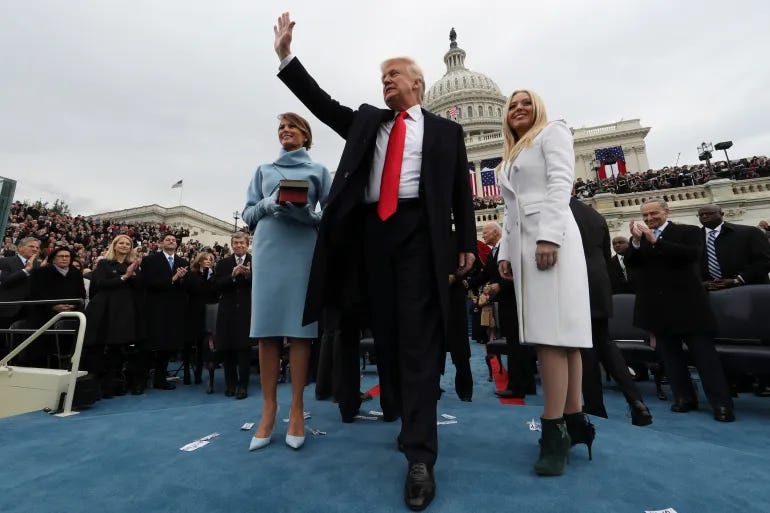Foreign Leaders at Trump’s Inauguration: Who’s Attending and Who’s Missing?
In a break from tradition, President-elect Donald Trump invites world leaders and far-right figures to his second-term inauguration.
Donald Trump is set to be sworn in as the 47th president of the United States on January 20 for a second term, with a day of festivities including musical performances and a parade. Unlike traditional inaugurations, Trump has broken from precedent by inviting a significant number of foreign leaders, including both allies and some of his rivals.
The guest list includes at least seven sitting heads of state and two former leaders, with an estimated 500,000 attendees expected. The inauguration’s departure from tradition raises questions about its international scope and the presence of right-wing and populist leaders.
A Departure from Tradition
Traditionally, US presidential inaugurations are domestic affairs. The ceremony typically takes place with US officials, past heads of state, and select dignitaries present at the Capitol, while the public watches from surrounding areas. This time, however, Trump’s inauguration will also include numerous foreign leaders, many of whom are aligned with his right-wing political views. Foreign leaders usually do not attend US inaugurations, with diplomats such as ambassadors or foreign ministers representing their countries.
Who’s Attending?
Trump has invited a diverse group of leaders, notably from right-wing or populist movements, but also from some of his international rivals. Notable invites include:
Argentina’s President Javier Milei: Milei, known for his far-right stance, has confirmed his attendance. Trump has praised him, even calling him the man who can “make Argentina great again.”
Chinese President Xi Jinping: Despite ongoing trade tensions, Trump extended an invitation to Xi in December. While Xi won’t attend, his Vice President, Han Zheng, will represent China.
Italy’s Prime Minister Giorgia Meloni: Leader of the far-right Brothers of Italy party, Meloni visited Trump at Mar-a-Lago in January. Her office stated she will attend if possible.
Hungary’s Prime Minister Viktor Orban: A close Trump ally, Orban won’t be attending due to a state address in Hungary.
Indian Prime Minister Narendra Modi: Although Modi is a longtime Trump ally, he won’t be attending. Instead, Foreign Minister Subrahmanyam Jaishankar will represent India.
Ecuador’s President Daniel Noboa: Noboa, who praised Trump’s December victory, confirmed he will attend after pausing his re-election campaign.
El Salvador’s President Nayib Bukele: While Bukele’s attendance has not been confirmed, his relationship with Trump’s son, Donald Trump Jr., makes it a possibility.
Former Brazilian President Jair Bolsonaro, a far-right leader, has also been invited but will not attend, as his passport was confiscated amid several investigations in Brazil.
Who’s Missing?
Some notable figures are noticeably absent from the guest list:
UK Prime Minister Keir Starmer: His office confirmed that Starmer has not been invited, while Nigel Farage, a leader of the far-right Reform UK party, will be present.
European Commission President Ursula von der Leyen: As a representative of the European Union, von der Leyen was not invited, nor were many NATO leaders, many of whom have centrist governments.
Germany’s President Olaf Scholz: Scholz, who leads the EU’s largest economy, was excluded, though far-right politician Alice Weidel from Germany’s Alternative for Germany (AfD) party is invited, represented by co-leader Tino Chrupalla.
French President Emmanuel Macron: Despite having cordial relations with Trump, Macron was not invited. Instead, Eric Zemmour, a far-right French politician, will attend.
Spanish far-right leader Santiago Abascal and Portuguese populist leader Andre Ventura are also set to attend.
Global Comparisons
Inauguration ceremonies worldwide often follow a domestic focus, with some exceptions. For example, India’s recent presidential inauguration in July 2023 hosted 9,000 guests, including several heads of state from neighboring countries. Similarly, Turkey’s President Recep Tayyip Erdogan invited 34 world leaders to his third-term inauguration in June 2023.
Trump’s second-term inauguration reflects a shift in the way presidential ceremonies are conducted, highlighting the global nature of his leadership style and the growing influence of populist and right-wing leaders worldwide. The inclusion of controversial and polarizing figures at the event signals the unique tone of his second administration.


